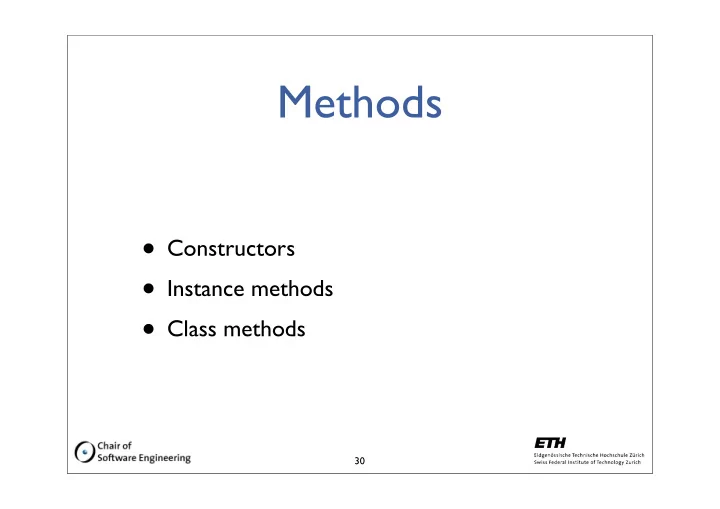

Methods • Constructors • Instance methods • Class methods 30
Constructors • have the same name as the class • do not return anything • they begin with a call to the constructor from the parent class (super(...)) public class MyClass{ public MyClass(){} ... MyClass mc = MyClass(); } 31
Instance Method • are called on a reference to an instance • can return values • C-style declaration and value return public class MyClass{ public boolean test(){ return true;} } ... MyClass mc=new MyClass(); mc.test(); 32
Class Method • Are called on the class name, instance names • declared static public class MyClass{ public static boolean test(){ return true;} } ... MyClass.test(); 33
The main method • static, returns nothing, public, String[] as parameters public class MyClass{ public static void main(String[] args){...} } 34
Inheritance • Methods and fields are inherited • They can be used in a child class without any redeclaration • They can be overriden • Overloading is ok 35
Exercises • final & volatile? • static and multithreaded? • local variable usable from another class? • declare a String that would be visible from outside the package, shared by all instances and can be accessed concurrently. 36
Why doesn’t it compile? public class HelloWorld { public String message="Hello World!"; public HelloWorld(String s){ super(); message=s; } } public class HelloWorld2 extends HelloWorld{ public HelloWorld2(String s){ message=s; } } 37
Why doesn’t it compile? public class HelloWorld { public String message="Hello World!"; private HelloWorld(String s){ super(); message=s; } } public class HelloWorld2 extends HelloWorld{ public HelloWorld2(String s){ super(s); } } 38
What happens here? public class Parent { public Parent wave(Parent p){ System.out.println("in the parent"); return null; } } public class Child extends Parent{ public Child wave(Object o){ System.out.println("in the child"); return null; } public static void main(String []args){ Parent p=new Child(); p.wave(p); } } 39
...and here? public class Parent { public Parent wave(Parent p){ System.out.println("in the parent"); return null; } } public class Child extends Parent{ public Child wave(Parent p){ System.out.println("in the child"); return null; } public static void main(String []args){ Parent p=new Child(); p.wave(p); } } 40
What is invalid? public class HelloWorld{ String s="Hello World"; public static void main(String []args){ System.out.println(s); } } 41
Expressions • Method Invocation • instanceof • Casts • blocks • control-flow structures 42
Invoking Methods • Already saw that: MyClass mc = new MyClass(); mc.test(); MyClass.testStatic(); this.test(); test(); 43
instanceof • instruction from the language • Returns a boolean mc instanceof MyClass 44
Casts • Used to assign an instance of a super class to a variable of a subclass • May fail at runtime! String S = (String)myObject; 45
Blocks • As in many languages blocks can be declared in place of any instruction and define a name space: { ... } 46
if • if ( test ) block/instruction ; • if ( test ) block/instruction; else block/instruction; if (ms instanceof MyClass) if (!(ms instanceof String)) System.out.println(”MyClass not String”); else System.out.println(”not MyClass”); 47
switch switch( expression ){ case constant : {} ... default: {} } 48
while while ( test ){ ... } 49
do...while do{ ... } while ( test ) 50
for for ( init ; test ; loopInst ){ ... } 51
Enhanced for • if the expression is Iterable (arrays are...) for( Type varName : expression ){ ... } 52
break/continue • break breaks the innermost loop • continue goes back to its start • with labels: act on the labeled structure 53
Recommend
More recommend